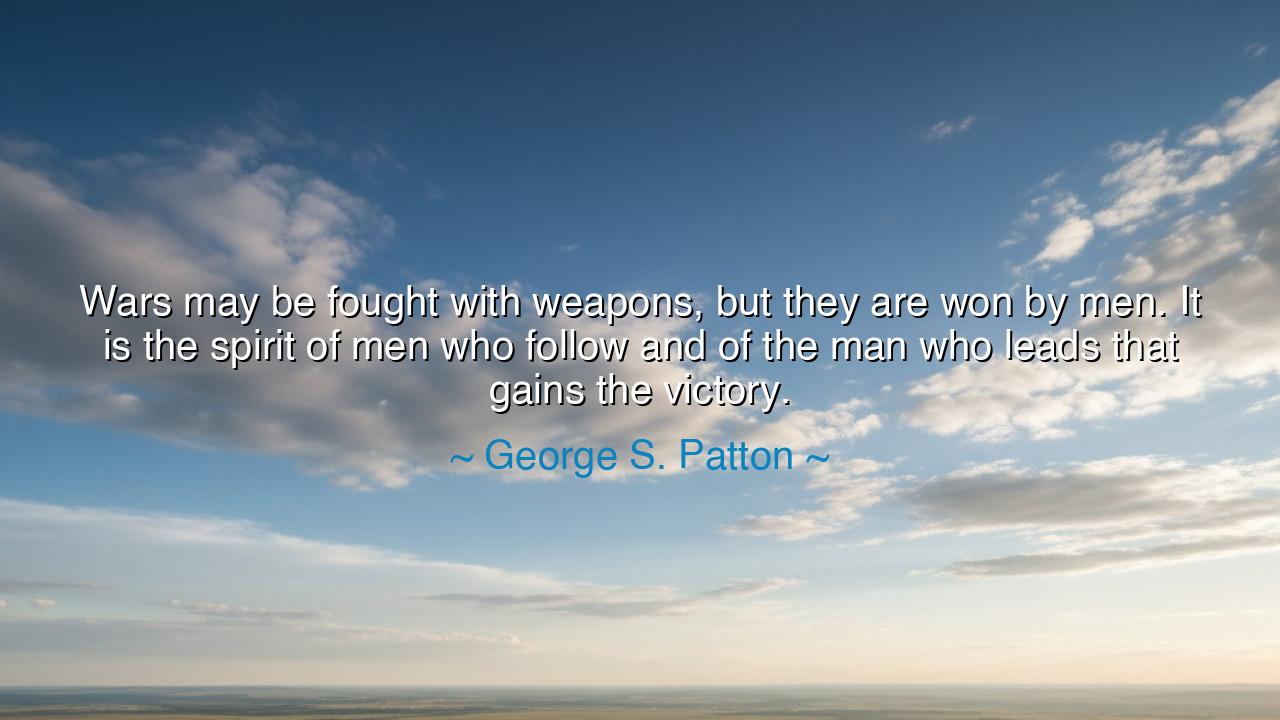
Wars may be fought with weapons, but they are won by men. It is
Wars may be fought with weapons, but they are won by men. It is the spirit of men who follow and of the man who leads that gains the victory.






Hear the fiery words of George S. Patton, warrior of the modern age, who declared: “Wars may be fought with weapons, but they are won by men. It is the spirit of men who follow and of the man who leads that gains the victory.” These words strike like thunder across the ages, for they reveal the eternal truth that no blade, no cannon, no machine of destruction has ever secured triumph without the will and courage of those who wield it. Weapons are tools, but it is the spirit of men—unyielding, steadfast, and united—that bends the tide of history.
The origin of this wisdom lies in Patton’s own experience upon the battlefields of the Second World War. He commanded not from afar but in the dust and fire of combat, where he witnessed firsthand that technology and armament alone do not decide destiny. An army may have tanks and planes in abundance, yet without courage in the ranks, without trust in leadership, and without unity of purpose, such weapons are nothing more than lifeless iron. Patton, a student of history, saw what all great generals before him had seen: wars are won not by the strength of the hand, but by the strength of the heart.
Consider the tale of the Battle of Marathon, where the Athenians, vastly outnumbered, faced the mighty Persian army. By weapons alone, they should have been crushed, for Persia’s power seemed insurmountable. Yet the Greeks fought with a spirit unbreakable, bound by love of freedom and the leadership of Miltiades. Their courage shattered the Persian advance and preserved their homeland. It was not the spear that won Marathon, but the spirit of the men who bore it, and the faith they placed in their commander.
So too in more recent times, the story of Winston Churchill stands as testament. Britain in 1940 was battered, its armies driven back, its skies filled with the enemy’s bombers. Weapons were scarce, allies distant, and defeat seemed near. Yet Churchill’s words, fierce and unyielding, lit a fire in the hearts of his people: “We shall never surrender.” That spirit of defiance, carried by ordinary men and women, became Britain’s shield. The bombs fell, but the nation did not break. Victory came not from weapons alone, but from the iron will of the people and the leader who inspired them.
Patton’s words also reveal the sacred bond between leader and follower. The man who leads must do more than command—he must inspire. He must awaken in his followers the conviction that their struggle is worth every sacrifice. Without this bond, armies fracture, and weapons rust unused. But when trust is present, when the followers believe in the vision of their leader, even the weakest army becomes strong, and even the mightiest enemy trembles.
The lesson for us all is clear: though few may ever fight on battlefields, each of us wages wars of our own—wars of spirit, of endurance, of justice. In these battles, we too are tempted to lean on tools, strategies, or clever devices. But Patton teaches that the true measure of victory lies in the spirit we bring, in the courage to persist, and in the trust between those who lead and those who follow. Whether in a family, a community, or a nation, weapons may open the struggle, but spirit decides the end.
Therefore, O listener, take this wisdom into your life. When you face your trials, arm yourself not only with tools, but with courage. When you lead, remember that your followers do not need your weapons, but your vision, your faith, your unwavering example. And when you follow, do so not out of fear, but with strength of heart, knowing that your spirit is as mighty a force as any blade or bullet. For in the end, it is as Patton declared: victory belongs not to weapons, but to men—and to the spirit that burns within them.






AAdministratorAdministrator
Welcome, honored guests. Please leave a comment, we will respond soon